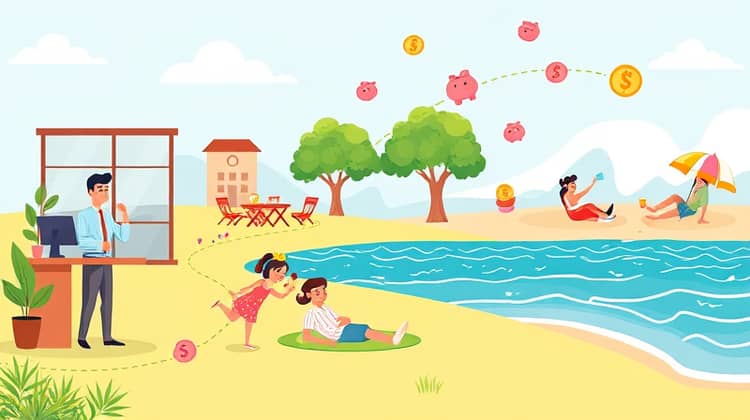Emergency Fund Adjustments: Strategies for Every Stage of Life

An emergency fund is not just a safety net; it is a crucial financial tool that can help individuals navigate life's uncertainties. Having money set aside for unforeseen circumstances allows for peace of mind and the flexibility to make informed decisions without the burden of financial stress. This article will explore the importance of an emergency fund at different life stages and offer strategies on how to build and adjust this fund to suit evolving needs.
Various life phases require different approaches to saving. A student may approach savings dramatically differently than a family or an empty-nester. It's essential to recognize that needs change over time, and so should our financial strategies. Understanding these nuances can aid in developing a robust emergency fund that absorbs shocks and maintains stability.
In this guide, we will delve into life stages from college to retirement, examining the critical steps necessary for establishing an emergency fund that matches the financial landscape of each phase. Whether you're just beginning, in the middle of your career, or enjoying retirement, strategies exist to ensure you are prepared for unexpected situations.
Why an Emergency Fund is Crucial

An emergency fund serves as a financial buffer that can stabilize your life during challenging times. Whether facing sudden medical bills, job loss, or necessary major repairs, having funds readily available reduces the need to rely on credit cards or loans, which can quickly spiral into debt.
During periods of uncertainty, an emergency fund not only alleviates financial stress but also grants you the freedom to navigate tough situations with confidence. It provides a layer of security for you and your family. Having this cushion can keep you from dipping into retirement savings or selling investments at a loss.
Establishing an emergency fund is often considered the first step in personal finance management. Financial experts recommend saving a minimum of three to six months' worth of expenses to ensure adequate coverage during unforeseen events.
College Students and Young Adults

For college students and young adults, the concept of saving can be both daunting and a luxury they often think they cannot afford. However, establishing an emergency fund early on is crucial. Even small, consistent contributions can build a safety net that may be necessary as they transition into independence.
Understanding that life can be unpredictable, students are encouraged to save for emergencies, even if they're starting with a small income or a part-time job. With their often limited resources, setting aside even a little can make all the difference in a crisis situation.
- Start with small milestones, like saving $500 to $1,000 as a starter fund.
- Cut back on unnecessary expenses to boost savings.
- Take advantage of any student discounts or financial aid that can alleviate costs.
Building an emergency fund in this stage creates habits that will persist into later life, laying the groundwork for more robust saving behavior.
Early Career Professionals

As young adults transition into full-time positions, their income typically increases, presenting a prime opportunity to ramp up savings. Early career professionals should focus on expanding their emergency funds now that stable income is becoming more prevalent. It's crucial to recognize the importance of this financial base.
The pressures of adult life, like rent, student loans, and starting families, make it even more critical to have a well-established emergency fund. This financial foundation is vital as it protects against unexpected events such as job loss or urgent medical expenses.
- Aim for three to six months’ worth of living expenses in your emergency fund.
- Consider increasing your savings rate as your salary increases.
- Regularly reassess your monthly expenses and adjust savings accordingly.
This stage is about finding the right balance between saving and enjoying life, but establishing this safety net should remain a priority.
Families

For families, an emergency fund can be a lifesaver, especially when considering the additional responsibilities and expenses that come with raising children. A family’s emergency fund must adapt to reflect the increased unpredictability of expenses, whether related to childcare, health care, or education.
It's advisable to gradually increase the fund as income grows or as children enter new life stages, ensuring that the financial buffer is sufficient to handle potential emergencies.
- Identify the total monthly expenses for the entire family.
- Calculate an ideal emergency fund target, aiming for six to twelve months' worth of expenses.
- Review and adjust savings goals annually based on changes in family income and expenses.
This proactive approach enables families to withstand unforeseen events while maintaining financial stability, helping to mitigate stress during challenging times.
Mid-Life and Pre-Retirement

As individuals enter mid-life, saving priorities often shift toward retirement, but an emergency fund can't be neglected. It is essential to balance emergency savings alongside retirement contributions, ensuring that unexpected events do not jeopardize long-term financial goals.
During this phase, it is common to reassess financial goals and adjust the emergency fund to accommodate new priorities, such as children's college tuition or eldercare.
- Ensure your emergency fund has grown to cover at least six months of expenses.
- Consider potential major expenses approaching, such as college costs for children or healthcare for aging parents.
- Review and optimize existing savings to free up more cash for the emergency fund.
Being prepared for unexpected events during mid-life can protect retirement savings and keep you on track toward reaching your long-term financial goals.
Retirees

Even in retirement, having an emergency fund is crucial. Once retired, your income may become more fixed, typically relying on pensions, social security, or savings withdrawals. Therefore, unplanned expenses can pose a significant threat to financial security at this stage.
Retirees can face unique challenges, such as increased healthcare costs and home repairs, requiring the need for a solid financial cushion to navigate these potential expenses without drawing down retirement savings immediately.
- Set aside at least six months' worth of living expenses in an easily accessible account.
- Regularly review your spending habits to adapt your emergency fund.
- Consider potential long-term care needs and account for those in your savings.
By prioritizing an emergency fund, retirees can enjoy their retirement years with greater peace of mind and financial security amidst the uncertainties that life may present.
How to Build and Adjust Your Fund

Building and adjusting your emergency fund requires diligence and foresight. Begin by determining your essential expenses; this will provide a clear target for how much you need to save. Once established, regularly revisit your financial situation to adjust your savings requirements as life circumstances change, such as a new job or changing family dynamics.
Start small, but aim for progress; even minor contributions can add up over time. Automate your savings to prevent the temptation of spending this portion of your income on discretionary items, which can quickly erode your fund. And remember to review your emergency fund strategy regularly to ensure it aligns with your current financial situation.
It's essential to remain adaptive; unforeseen events can alter your financial landscape, requiring adjustments to your savings strategy. Whether it’s an increase in expenses due to a new family member, a job change, or a financial goal that shifts, staying attentive will prepare you to adjust quickly.
- Create a separate savings account specifically for your emergency fund.
- Automate transfers to your emergency fund to build savings effortlessly.
- Review your expenses regularly to reflect changes and adjust savings accordingly.
By being proactive about building your fund and adjusting it as needed, you empower yourself to navigate life's challenges more effectively.
Conclusion

In conclusion, no matter where you are in life, having an emergency fund is a fundamental aspect of sound financial planning. Whether you're just starting your career, raising a family, or enjoying retirement, your needs will evolve, and so should your strategies for maintaining an emergency fund.






